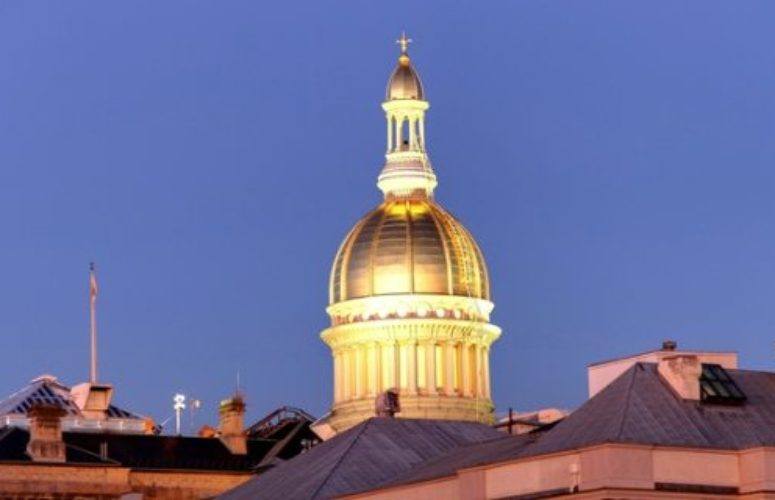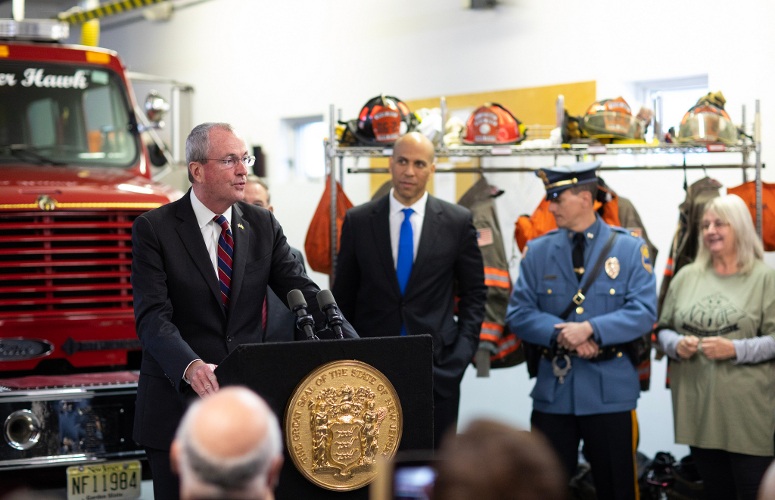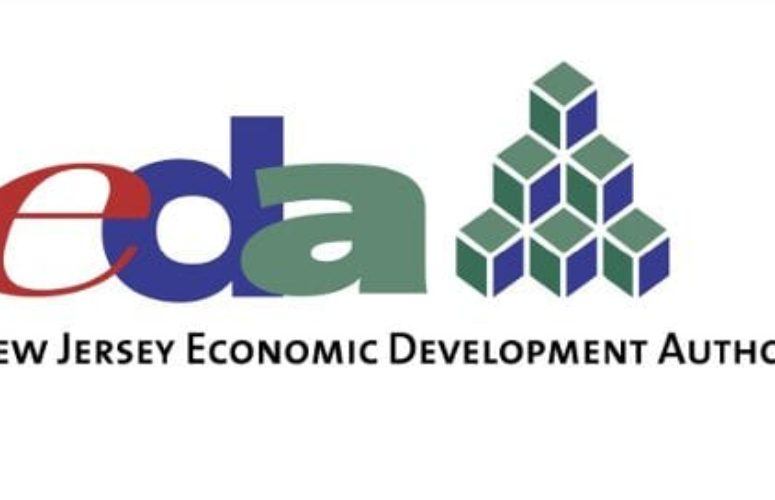
Business Leaders Comment on Gov. Murphy’s First Budget Address
By Anthony Birritteri, Editor-in-Chief On Mar 14, 2018Gov. Phil Murphy’s first budget address received mixed reviews yesterday at the New Jersey Business & Industry Association’s annual Budget Reception, where more than 85 business leaders gathered to watch the event at the Masonic Temple in Trenton as it was being broadcast live from the Statehouse. The crowd increased to more than 100 as legislators and guests left the capitol building to mingle with NJBIA members and staff at the historic site.
The governor introduced a $37.4 billion fiscal year 2019 budget that is $2.7 billion higher than the current $34.7 billion budget (a 7.8 percent increase). It includes $1.7 billion in tax increases coming from initiatives such as: implementing a millionaires tax by increasing the state income tax rate for those earning more than $1 million to 10.75 percent (currently, there is a top-end income-tax rate of 8.97 percent on those earning more than $500,000); increasing the sales tax from 6.625 percent to 7 percent; legalizing marijuana, which could generate $80 million in revenues this year; and changing the corporate business tax.
Other budget proposals included: raising the minimum wage to $15 via a four-year phase in, including an increase to $11 an hour in fiscal 2019; contributing $3.2 billion into the state workers’ pension system (a 28 percent increase from last year); supporting legislation that would raise the property tax deduction from state income taxes to $15,000 (it is currently capped at $10,000); increasing the Earned Income Tax Credit (EITC), allotting an additional $27.2 million to the EITC this year, helping more than 510,000 families; and increasing funding to NJ Transit by 172 percent, which translates into appropriating an additional $242 million to the transit agency.
“This is a budget that is balanced both fiscally and morally,” Governor Murphy said. “Our constitution requires the former, but our conscience demands the latter. It is a budget that puts New Jersey families ahead of the wealthy and special interests – and that recognizes that we cannot build a brighter future by acting timidly and thinking small.”
At the budget reception, NJBIA President and CEO Michele Siekerka commented that everyone must come together to work and advance New Jersey’s interests, saying that, “We all have an interest in investing in our infrastructure, our people, in workforce development and education. NJBIA stands firmly behind these issues,” Siekerka added. “However, we have to make sure that pathway that leads to all of these things is fiscally responsible.”
In a statement issued by NJBIA, Siekerka furthermore said the millionaires tax “directly impacts small businesses that flow their income taxes through personal returns. Many of these business owners are not millionaires, but would be considered so under the governor’s proposal. NJBIA has long opposed the tax because it is an added levy against people who provide jobs and will exacerbate our standing as the No. 1 outmigration state in the nation.
“New Jersey now has a net loss of nearly $25 billion in adjusted gross income over the last 12 years as businesses and residents gravitate to states that are more tax-friendly, such as Pennsylvania and New York. We would expect the enactment of a millionaires tax to further this negative trend,” she commented.
Brian F. Neuwirth, NJBIA board of trustee chairman and president of UNEX Manufacturing, said the millionaires tax is “an easy sell, but it is going to hurt New Jersey via the outmigration of people who have accumulated wealth here, who will go elsewhere if they have to give back more than what they think is their fair share.”
Regarding the $15 minimum wage, Neuwirth said a gradual increase is good, but it will hurt Main Street businesses in New Jersey if there aren’t any carve-outs in the legislation.
Jim Kirkos, president and CEO of the Meadowlands Regional Chamber of Commerce, said the phasing in of the $15 minimum wage over time is the right thing to do, but he would also like to see carve-outs, such as exemptions for seasonal businesses, so they “would not be hurt by the wage increase.”
Michael Affuso, senior vice president and director of government relations for the New Jersey Bankers Association, said the governor presented an aggressive plan. “It seems like he is taking steps to address things that haven’t been addressed in a long time. However, you are not going to be able to raise taxes every year for the next four years to pay for these proposals. So, I think a deep dive on the spending side has to be taken.”
Commenting on the sales tax increase, Assemblyman John DiMaio (R-23), said it will affect everyone in the state, “all the way down to the working poor who have to give up more of their dollars due to the increase. In that one move, $563 million will come out of the real economy and go to the state.”
The overall 7.8 percent budget increase is troubling, DiMaio added. “If that trend continues over the next three to four years, the state will be right back to where it was some eight years ago … we can’t keep on spending New Jersey into the abyss.”
On the millionares tax and outmigration, he said the rich will leave the state, and the people left behind will have to make up the lost revenue difference. “It’s a spiraling effect that impacts the middle class over time as you increase taxes and government spending. We need to look at this more cautiously and hope we can do favorable work during the budget negotiations process,” DiMaio said.
NJBIA member Craig Gibello, who owns a commercial and industrial roof contracting business, said he did not hear much in the budget address on business growth. The address was “great for residents, but I didn’t hear anything about making New Jersey more pro-business. I also wonder how the state is going to pay for the things the governor is proposing.
“I am also concerned about the legalization of marijuana. I don’t know how that is going to change the drug testing laws, and I don’t know how insurance companies are going to react to it,” he said.
Keith Hovey, an attorney at the law firm of Szaferman, Lakind, Blumstein & Blader, P.C, said that the legalization of marijuana, from a fiscal standpoint, has been positive for the states that have made the substance legal. “However, we don’t know what the long-term impacts are, so we have to proceed with caution,” he commented.
From a legal industry perspective, he said law firms will be busy on two fronts: helping expunge peoples’ past marijuana convictions and helping new distributors on regulatory compliance requirements. “You don’t want to be venturing into new areas without the assistance of legal counsel,” he advised.
Overall, Kirkos – of the Meadowlands Regional Chamber of Commerce – said the new governor should be given a chance to make his policies gain traction. “I have had conversations with Gov. Murphy that lead me to believe he understands that we have to grow our business environment and create a strong economy,” Kirkos said. “The governor is committed to doing that in a more fair way. I want to give him the chance to do that, provided we are watching things carefully so that the business climate isn’t negatively impacted.”
To access more business news, visit njbmagazine.com
Related Articles:





